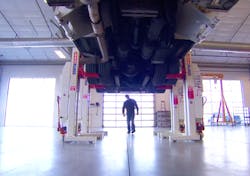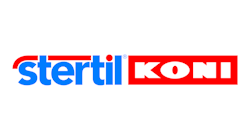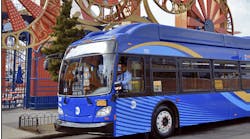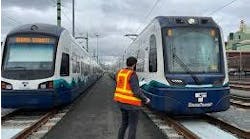Stertil-Koni Analysis Identifies 7 Key Steps to Boost Vehicle Lift Safety in Large Maintenance Shops
Following a detailed review of bus and truck maintenance facilities across North America, Stertil-Koni has just released what it calls the “Seven Key Steps” to improving safety for busy technicians working on the shop floor.
The challenges facing fleet operators of all types are significant and continue to grow.
Noted Peter Bowers, technical sales manager for Stertil-Koni, “Commercial vehicle fleets across North America — ranging from transit agencies, public works departments, municipal governments, school districts, the U.S. Military and large corporations — are increasingly utilizing higher capacity vehicles that often run hotter. What’s more, these vehicles require specific maintenance procedures that must be performed on an established timetable. Thus, fleet downtime is the enemy.”
“At the same time,” added Dr. Jean DellAmore, president of Stertil-Koni, “safety is paramount. That’s why our team has identified seven key steps associated with vehicle lifts to help boost safety and advance shop productivity.”
- Certification: In today’s complex fleet maintenance facilities, managers should make sure that their lifts carry the coveted “Gold Label” from the Automotive Lift Institute (ALI). As the ALI website states: “There’s more riding on your vehicle lifts than cars and trucks… it’s crucial that they are chosen with care.” The ALI Lift Certification Program has made it easy for lift buyers to choose lifts that have been third-party tested and proven to meet the safety and performance requirements outlined in the safety standard ANSI/ALI ALCTV (current edition). Lift testing includes verification of the structural integrity of all of a particular lift model’s systems and components, proper function of its controls and load-holding devices, proper lowering speeds, and overload protection. For its part, Stertil-Koni is proud to have the highest number of ALI certified heavy-duty vehicle lifting products in the industry.
- Lift Selection: Weight and Height Matters: Facility maintenance workers should know in advance the weight of the heaviest vehicle they intend to lift and make absolutely certain that the lift selected is certified to meet or exceed that capacity. In terms of height, always measure the height clearance of the facility – prior to selecting a lifting system – to ensure ample room to raise a vehicle for servicing. Further, note the height of the tallest vehicle you intend to lift and make certain there is sufficient room to raise the vehicle to a proper height that will permit a technician to work comfortably underneath the vehicle.
- Vigilance During Set-Up: When ready to operate the lift, do a full sweep of the area. Check the perimeter of the lift to confirm that nothing is obstructing its path and there are no hazards. Then, lift the vehicle no more than 12 inches off the ground, pause, and do another sweep of the area to further check that there are no impediments. Also, make sure that the vehicle being lifted is level.
- Keep it Stable: Before you begin with mobile column lifts, always place them on a firm foundation and level ground. And when lifting outdoors, be aware of wind loads. Also, make certain that all personnel are clear of the vehicle and that the wheels on the vehicle being raised are properly engaged with the forks on the mobile column lifts. For in-ground lifts, operators should check that the contact points are properly positioned. Further, select a lift with an “electronic synchronization” system. In this way, as the lift goes into motion, and continues through the full-range up to its maximum height, vehicles will lift smoothly, even those with unequal weight distribution, such as fire trucks, airport tugs and pumpers.
- Technician Protection: At all times, lift vehicles to the proper height allowing technicians to move about and work comfortably underneath the vehicle. All Stertil-Koni, heavy-duty vehicle lifts include an independent mechanical locking system that can be heard locking into place. The narrow locking intervals, at 1.375 inches, provide added safety and allow the lift to be lowered into the locks at a convenient height for the technician.
- Maintain a Strict Maintenance Schedule: Make certain that all lifts are subject to a regular program of scheduled maintenance – in accordance with the manufacturer’s recommended schedule – and receive annual lift inspection by a certified lift inspector.
- Create a Culture of Safety: Beyond choosing the right lifting system, promoting a positive culture of safety at the shop is essential. Service bulletins, safety messages, and continuously updating technicians’ skills are vital to a smooth-running maintenance facility. Stertil-Koni also suggests using accessories specifically designed to ensure fleet maintenance operator safety and proper ergonomics.
- One example is a high-lift wheel dolly. It allows wheel removal and proper alignment of dual tire assemblies and brake drums to be completed efficiently and accurately, without back strain.
- Make sure only authorized personnel operate the lifts. Select a lifting system that prevents unauthorized access to lift operation. This could take the form of a locked control box or a secure key or “wand” – necessary to activate the lift system before use.
- Consider using wireless mobile column lifts. These eliminate the need for interconnected communication cables and thus remove the risk of tripping.
Concluded DellAmore, “In the heavy duty vehicle lift business, safety should always be a top priority. With a well-planned safety-first approach, technicians can perform their duties efficiently and with confidence, thereby, contributing to a positive workplace atmosphere as well as greater longevity of the vehicles they service and the equipment they utilize.”




